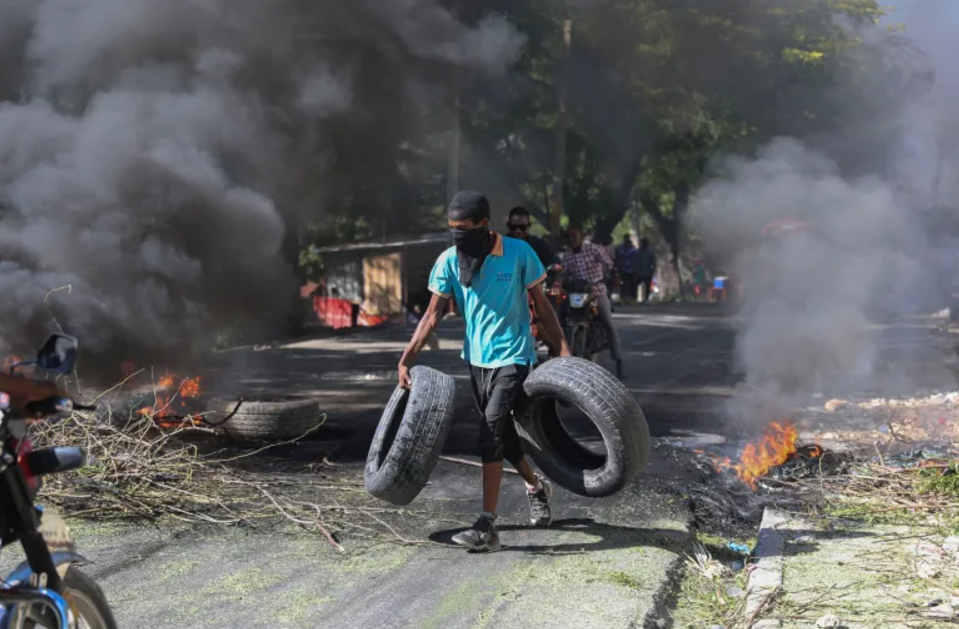First Person is a daily personal piece submitted by readers. Have a story to tell? See our guidelines at tgam.ca/essayguide.
Illustration by Juliana Neufeld
On a recent Saturday morning, I shepherded two seven-year-olds in matching red jerseys, shorts and knee socks through the revolving doors of a massive stadium under an inflatable bubble. As we reached the farthest of six or seven adjoining fields, I knelt to help my son and his friend tie their cleats. I heard someone call my name.
I turned and saw a woman from my street, someone I know by name and with whom I’ve exchanged smiles and nods but never a conversation, save a brief exchange at the school while wearing blue rubber gloves and doling out pizza to hungry kindergartners. Aside from her kids’ ages, all I knew about her was her Arab name and impeccable wardrobe.
And that few months ago, a lawn sign appeared in her front yard reading, “East End for a Free Palestine.” At first, I almost missed it – the delicate black and white design with no red or green flag colours in sight and cursive lettering surrounded by line art olive branches. When it finally registered one morning as I walked my kids to school, I instinctively lowered my voice, beckoning them in Hebrew to stop dawdling – kadimah! Over Halloween, the sign was surrounded by ghosts in witch hats (“activist ghosts – very spooky,” my husband joked). Soon the ghosts will give way to red-nosed reindeer, but I expect the sign will remain constant as the seasons shift around it.
My neighbour’s smile was inviting, and since we were on the sidelines of soccer practice rather than on the street, there was no easy way out. She was in a deep squat, rubbing her hands together for warmth. I crouched next to her, a comfortable gesture that felt less odd than it probably sounds. “We should do yoga while we wait,” she quipped. I wasn’t exactly dressed for it. The vintage Issey Miyake wool sweater inherited from my mom, paired with high-waisted mom jeans (not from my mom), was a small act of sartorial rebellion. If I’ve become a soccer mom, I’d decided while standing in front of my closet that morning, I refuse to wear Lycra. I admitted that my weekend wellness routine mostly gets sacrificed to shuttling and feeding kids. “Let’s do a lap!” she suggested with surprising enthusiasm. I shrugged, and before I knew it, we were jogging (note: I do not jog) around the stadium track.
“Well, that warmed us up,” I said, aware we’d just broken the ice in more ways than one. For the next 45 minutes, we talked, pausing only when our kids demanded their water bottles or shouted, “Did you see that?!” (We hadn’t.) She spoke lovingly about mothering young children. “It’s the most precious time, isn’t it?” Then, she confessed she misses adult conversation, having left her job as an account executive to be more present for her kids. Her mom was rarely around and she used to think she wouldn’t have children herself. “I got a late start,” she said, almost conspiratorially. “I’m 45.”
“I’m 43,” I said with a smile, and her face softened as a look of recognition passed between us. We talked about the challenge of cultivating one’s own garden while tending to a young family, how we’d built careers only to lose momentum after our kids came along, and the difficulty of forming friendships with other moms a decade younger than us. “I guess I’m still looking for my tribe,” she mused. I smiled inwardly at the irony. Of all people to imagine in her “tribe” – me, the half-Israeli Jewish mom down the street who stiffens every time she passes that lawn sign.
What didn’t come up? Our fathers, and the complicated histories they carry from the same region. Somehow, the weight of identity politics gave way to the common experience we found as mothers observing previous identities slip away.
But if it had come up – or if it does next week? In an offhand mention of hummus, or my years in Tel Aviv, or some careful allusion to “the state of the world”? Would we then have at it, or retreat to polite smiles and nods?
For now, I’m content with what we’ve shared already: the quiet struggles of motherhood, the pieces of ourselves we’ve lost and perhaps want to reclaim, and the ease of cheering for our children – perhaps even glimpsing something of ourselves reflected in each other.
Rachel Seelig lives in Toronto.




/cdn.vox-cdn.com/uploads/chorus_asset/file/25566661/454688286_10162253797240312_4972473333184729900_n.jpg)


![25th Nov: Cold Case: Who Killed JonBenét Ramsey (2024), 3 Episodes [TV-MA] (6/10)](https://occ-0-902-92.1.nflxso.net/dnm/api/v6/Qs00mKCpRvrkl3HZAN5KwEL1kpE/AAAABQZprnyrF8U9LeEttMlZZDemqxv_gcAs8vtZfAM-Jsb9iw9ckp6mr3HAMrH---KfXpmtu57nx_Y-tKsii0Bmstd5mtVVB6cEuh6ayvAzdYLe3BiAI99CgZWqNy3b1x5Lfua1JuyidOSAIYDpb2piP-lNENqIVrr8i2TS8FrgXemxCsR3pazi-J0cwFm8X3XrkLHVh01qllUrqZZYjLON9oOeD9tmHmvP-P41hXp0gyyLL-4QZ96dEfYLzHzNM9g-8f8RtSmKiYEIXWL2haK14M2kQvc3uB87UBDhtP36dpHTZWe-DGzqHpczpg.jpg?r=f56)






